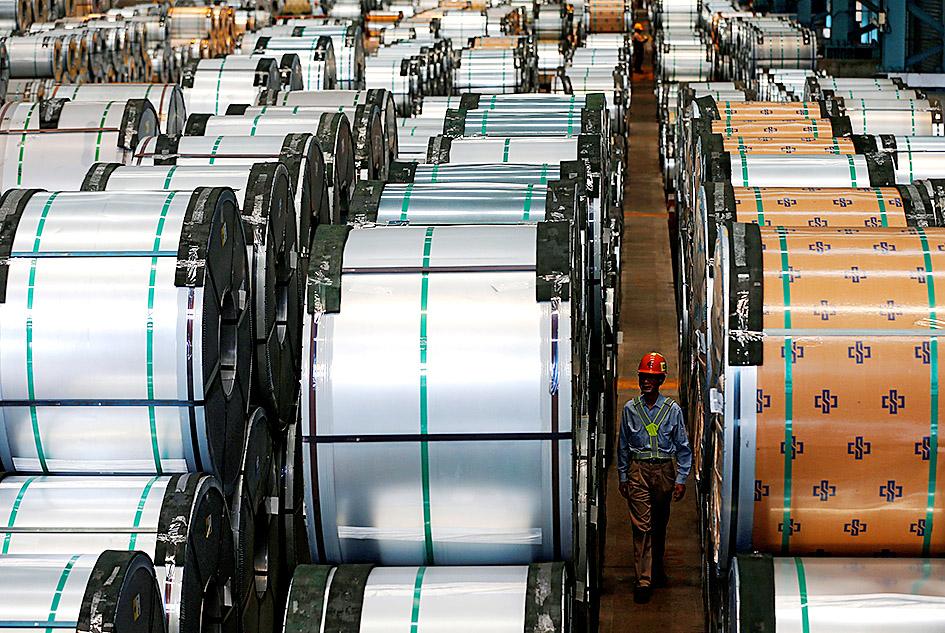China Steel Corp (CSC, 中鋼), the nation’s largest integrated steelmaker, yesterday said that it would raise domestic steel prices by 9.5 percent for delivery next month, with the hike exceeding market expectations.
The adjustment is the eighth straight month of increases for the Kaohsiung-based company.
Prices are to increase by NT$2,200 per tonne for hot-rolled steel, hot-rolled plates and electro-galvanized sheets, NT$2,500 per tonne for cold-rolled steel and NT$3,000 per tonne for electrical sheets, CSC said in a statement.

Photo: Tyrone Siu, Reuters
The company attributed the price hikes to increased raw material costs for steelmakers and robust demand for steel, it said.
On the supply side, iron ore prices are at “a 10-year high” of up to US$170 per tonne, the company said, citing market concern about supply constraints at Brazilian and Australian mining operations.
Along with coal prices remaining high — up to US$105 per tonne — CSC’s costs for steel production have jumped “by US$60 to US$65 per tonne,” it said.
Global demand for steel has soared as economies around the world continue to recover, it said.
“It is not unusual to see buyers chasing limited supply, and some Japanese steelmakers have put January orders on hold,” CSC said.
Japanese hot-rolled steel has traded for as much as US$800 per tonne, while in Europe it has broken US$850 and in the US reached US$1,200, closing in on a record, CSC said.
Hot-rolled steel is mainly used in the manufacturing of automobiles, home appliances and sports gear.
CSC said domestic steel prices still lag behind international prices, indicating that there remains room for increases.
“Although our prices for domestic delivery are far lower than international levels, we have to take into consideration the competitiveness of downstream companies as the New Taiwan dollar rises” against the US dollar, CSC said.
“We are keeping to our principles of smooth and stable pricing, while reflecting material costs,” it said.
Meanwhile, the company on Monday called for discipline among Taiwanese steel companies amid an overheated local market.
“There have been reports of steel firms hoarding stock and pushing prices up. We call upon the industry to maintain an orderly market,” CSC said.

KEEPING UP: The acquisition of a cleanroom in Taiwan would enable Micron to increase production in a market where demand continues to outpace supply, a Micron official said Micron Technology Inc has signed a letter of intent to buy a fabrication site in Taiwan from Powerchip Semiconductor Manufacturing Corp (力積電) for US$1.8 billion to expand its production of memory chips. Micron would take control of the P5 site in Miaoli County’s Tongluo Township (銅鑼) and plans to ramp up DRAM production in phases after the transaction closes in the second quarter, the company said in a statement on Saturday. The acquisition includes an existing 12 inch fab cleanroom of 27,871m2 and would further position Micron to address growing global demand for memory solutions, the company said. Micron expects the transaction to

Vincent Wei led fellow Singaporean farmers around an empty Malaysian plot, laying out plans for a greenhouse and rows of leafy vegetables. What he pitched was not just space for crops, but a lifeline for growers struggling to make ends meet in a city-state with high prices and little vacant land. The future agriculture hub is part of a joint special economic zone launched last year by the two neighbors, expected to cost US$123 million and produce 10,000 tonnes of fresh produce annually. It is attracting Singaporean farmers with promises of cheaper land, labor and energy just over the border.

US actor Matthew McConaughey has filed recordings of his image and voice with US patent authorities to protect them from unauthorized usage by artificial intelligence (AI) platforms, a representative said earlier this week. Several video clips and audio recordings were registered by the commercial arm of the Just Keep Livin’ Foundation, a non-profit created by the Oscar-winning actor and his wife, Camila, according to the US Patent and Trademark Office database. Many artists are increasingly concerned about the uncontrolled use of their image via generative AI since the rollout of ChatGPT and other AI-powered tools. Several US states have adopted

A proposed billionaires’ tax in California has ignited a political uproar in Silicon Valley, with tech titans threatening to leave the state while California Governor Gavin Newsom of the Democratic Party maneuvers to defeat a levy that he fears would lead to an exodus of wealth. A technology mecca, California has more billionaires than any other US state — a few hundred, by some estimates. About half its personal income tax revenue, a financial backbone in the nearly US$350 billion budget, comes from the top 1 percent of earners. A large healthcare union is attempting to place a proposal before